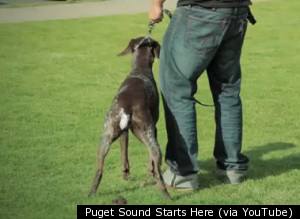
By Lynne Peeples
Performer Martin Luther sings to the familiar tune of Blackstreet's "No Diggity" as he swoops in to "bag it up" — the artist's hand shielded by a plastic doggie bag, of course.
"Dog Doogity", the new music video created by the Seattle-based Puget Sound Starts Here is a f resh approach to persuade people to pick up after their pets. Despite campaigns that have passed out pamphlets and placed boxes of plastic bags in public parks, area residents still find themselves dodging doodies on sidewalks, lawns and trails.
"The thing about dog waste is that it's the only bacteria source that people willingly leave on the ground," Janet Geer, spokesperson for a partnership of regional governments dedicated to improving local water quality, told The Huffington Post. "For some reason it doesn't sink in that it is raw sewage."
While Geer acknowledged the power of poop "to bring out the 6-year-old in a lot of people," she also emphasized the seriousness of the issue.
It's not just a stinky situation — skipping scooping poses a public health hazard.
For one, pet feces carry bacteria, viruses and parasites into waterways that can cause unpleasant infections such as giardia and E. coli. More indirectly, the excrement also releases nutrients into the water that can feed algae, kill marine life, contaminate beaches and send unlucky swimmers home with bouts of diarrhea or hives.
As Luther states simply in the song: "Hey yo, you don't want to swim in poo."
The Puget Sound area is home to over a million dogs, which the campaign estimates generate as much waste as about 300,000 people. And just like their owners, the dogs' are contributing to one of the region's major concerns: the pollution of the Puget Sound.
What's more, the Associated Press reported Monday, "too much pollution from animal and human waste has been washing into Samish Bay in north Puget Sound, prohibiting shellfish harvests 38 days already this year."
The problem isn't limited to the Pacific Northwest, or even the people who eat the Pacific Northwest's prized seafood. The U.S. pet dog population reached a record 78.2 million in 2010, the Wall Street Journal reported. The high number of pets is particularly noticeable in high density cities.
Along Stratford Avenue in the Bronx borough of New York City, for example, residents have to be careful where they walk.
"There's always dog poop everywhere," Bronx resident Migdalia Cordero told News Channel 12 last week. The current $250 fine for failure to pick up waste is having little impact, as enforcement requires a perpetrator to be caught in the act.
Jefferson County, Colo., recently unleashed a team of volunteers to approach and remind dog owners that "there is no poop fairy," after an imposed $30 fine alone wasn't doing the trick, according to the Denver Post.
"Unlike wild-animal feces, dog poop does not biodegrade quickly," the Post reported last week.
Meanwhile, one landlord in New Hampshire is going a step further in her effort to avoid stepping in doo-doo: mandatory DNA testing of all dogs that live in her apartment complex. If abandoned waste is found, she enlists a program called PooPrints to match samples with the dog database, CNN reported.
Leaving a pet's droppings on the sidewalk or in a park is not a crime in every municipality, but the environmental risk likely sits outside the law anyway — hiding in people's backyards or other private property.
When it rains in Seattle, feces left in any of these places can wash into storm drains and ditches, which then flow untreated to the nearest lake, stream or wetland and ultimately wind up in the Puget Sound.
"Pet waste is one of the primary sources of bacterial contamination in our local streams," Geer said. "It's in almost all the water samples we've tested."
Of course, once you do scoop the poop, there remains the question of what to do with it.
Composting or flushing the waste down the toilet in biodegradable bags are options that have garnered recent attention. However, according to Geer, these strategies are not yet ready for wide adoption; compost generally doesn't get hot enough to kill pathogens and flushable bags don't necessarily break down and could result in clogged pipes.
Simply picking it up and putting it in the trash is the best way to go, she said.
Article courtesy of huffingtonpost.com

